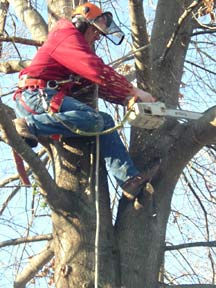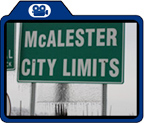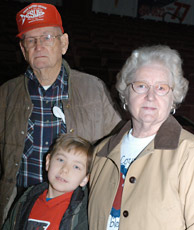Wayland’s centennial history a labor of love for professor
Updated: 2/02/07
| Estelle Owens peruses copies of the Hale County Historical Association journals in the Mabee Learning Resources Center on the Wayland Baptist University campus while gathering history on the university for the centennial book. |
Wayland's centennial history a labor of love for professor
By Teresa Young
Wayland Baptist University
PLAINVIEW—Estelle Owens figures she looks a bit more tired than usual these days. After all, long hours, long nights and long stretches of highway can wear on a person. But she’s quick to admit every article she has read and every interview she has conducted for Wayland Baptist University’s centennial history has been a labor of love.
When approached a few years back to research and compile Wayland’s complete history for its centennial celebration, Owens jumped at the chance. She won’t deny the work has been tedious at times and the majority of her free time has been swallowed up with the process, but she’s also had the experience of a lifetime.
“I am so thrilled to get to be the one who gets to put the words on paper,” said Owens, a history professor and chair of the social sciences division at Wayland. “I know there are others who could do it well and love it, but not more than me.”
As a 1971 Wayland graduate, Owens has a special place in her heart for the university where she has worked since 1974. And while teaching students is a particular passion—students for decades have bragged on her exciting and enlivened lectures about historical events—rolling up her sleeves and digging through history also is a great love.
Officially, Owens began her work on the history book in the fall of 2005, culling the archives to locate what the university already had in place and what needed to be added. Granted an extended sabbatical for spring and summer 2006, Owens spent eight months in discovery mode, looking through old newspapers and periodicals, traveling for oral history interviews and making countless copies.
But Owens insists the work actually began decades ago in her early days on the faculty. In 1976, Gwin Morris, then chair of the social sciences division, had some extra travel money and sent Owens to California for a series of interviews with former President Bill Marshall.
“I spent a week there, and we did 12 to 14 interviews—one in his convertible,” Owens recalled. “We talked about his life, his travels, his time at Wayland and his two years in the jungles of Brazil.”
That first set of presidential history interviews morphed into a series, and Owens also interviewed former presidents Roy McClung, A. Hope Owen, David Jester and the wife of Glenn Barnett, who served as interim from 1987 to 1989. Not finding much about the first four presidents, Owens made them her first target, noting, “I’m really fascinated with the early years.”
She still lacks oral histories for Wallace Davis, Lanny Hall and current President Paul Armes.
Although not all of Wayland’s history involves the presidential suite, Owens noted that filling in the blanks of the presidents provides a backbone to the overall historical picture. Many of the key decisions in Wayland’s history came through its leadership, and diving into the lives of the presidents helps set the stage for why those decisions were made.
Through her voyage of discovery, Owens has come to appreciate the men who served in Wayland’s highest office a little more.
“With all these people, there has been a willingness to give way beyond the point where it hurts, and not just money either. Some of them had fragile health, but they just sucked it up and kept going,” she said. “Another impressive thing is how many ties there were between people, and some presidents shared ties to churches they had pastored.
“It’s such a tiny world when you get right down to it. There is such symmetry to our past.”
The majority of Owens’ fact-finding mission has involved poring over old issues of the Baptist Standard, the Trail Blazer university publication and the Plainview Daily Herald, among others. Much of that, she notes with bleary eyes, was done via microfilm. After 10-hour stretches of searching, Owens admits she left the Mabee Learning Resources Center a bit weary.
Luckily for future researchers, Owens made photocopies of everything she found so the tedious microfilm searches would not have to be repeated. She estimates she’s added at least 20,000 pages to the archives from her searches. Other items were gleaned from archive files of old catalogs, letters, speeches, diaries and journals, and other papers stored away in boxes in the basement of the Mabee Center.
Among her summer travels, Owens visited Waco, poring through archives at Baylor University, where many former presidents earned their education. She also visited the archives of both Southern Baptist Theological Seminary in Louisville, Ky., and Southwestern Baptist Theological Seminary in Fort Worth. And she spent much time with the Southern Baptist Convention archives in Nashville and those of the Baptist General Convention of Texas in Dallas, along with other state Baptist papers and records.
“It takes being a bloodhound and a genealogist,” Owens said of the search. “It’s amazing when you have experience with genealogy what you can find through family research.”
Even though she still has stacks of papers to read and files to peruse, Owens said the journey has been enjoyable, as she’s learned so much about the university and its people. She’s even more convinced of God’s hand on the university as she reads of other schools that closed their doors over the decades.
“I’m awe inspired when I see what these folks were willing to do to get their education, and our students now are willing to do it as well,” she said. “It is so obvious when you get into it that this is providential. God wants us here, and he wants us out where we are.
“It’s incredible that a little school on the plains of Texas could have the kind of awesome impact on so many people. The Wayland imprint is there on lots of people.”


